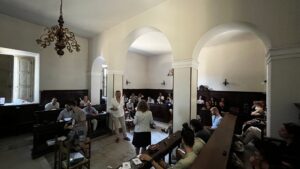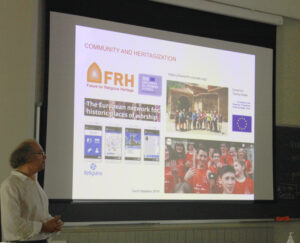
When a church, a monastery, or a convent loses its function, a new situation begins which is not just challenging for the religious community who dwelled in those spaces, but also for the churchgoers’ community, and for the entire civil society that lives and revolves around that building. These properties often fall into neglect and abandonment or are sold and inexorably transformed into exclusive destinations such as spas, luxury hotels, etc. Fortunately, some people do not give in to a fate that has become commonplace and predictable but instead study the possible alternatives.
Rethinking a future for these assets that, on one hand, is economically sustainable, and, on the other, appears compatible with the genius loci that has characterized the place for centuries, constitutes a demanding challenge that requires the intervention of different skills: architectural, legal, economic, theological and managerial. Therefore it is important to train professionals who will have to deal with these issues in future decades.
The first edition of the Lucca summer school was held in 2019 and explored the topic of reuse for monastic heritage. Its proceedings, published by the journal in-bo, were already available online (https://issuu.com/in_bo/docs/00_la_casa_comune_compressed) when the erasmus+ project LED2LEAP decided to focus its intensive program in Lucca, leading to a new second edition of the 2019 summer school.

This new ten days workshop, from 25th July to 3rd August 2022, specified its contents and focused on the themes of landscape and participatory processes for the reuse of abandoned ecclesiastical heritage involving an international community of students coming from the Universities of Bologna (Italy), Budapest (Hungary), Maryland (United States), Nürtingen (Germany), and Uppsala (Sweden) with the coordination of Le Notre Institute (Netherlands).
During the ten days of the workshop, there were alternating moments of advanced training, with lectures by speakers from the most prestigious universities and research centres, held at the Scuola IMT Alti Studi Lucca headquarters, and guided bicycle tours of Lucca in order to better understand the landscape, its characteristics and peculiarities. Among professors known to FRH, Thomas Coomans de Brachène intervened spending a week of his time with the students, and contributing to the intensive program with numerous lessons and also with an introduction to the activities and research promoted by FRH.
Near its closing, one day was dedicated for reviewing the work done by students for the case study, the former Augustinian monastery of Vicopelago, located in a hamlet of the Tuscan city. Once a manor house, then a monastery, this building is linked to the life of the great opera composer Giacomo Puccini (whose sister Iginia was appointed abbess several times) who performed his one-act opera Suor Angelica for the nuns on the piano for the first time there. In 1999 the complex was abandoned by the community of nuns, who were too few to manage the immense complex and moved elsewhere.

The students were asked, in light of meetings with potential stakeholders, to imagine concrete adaptive reuse strategies of this impressive building. The solutions put forward by the five groups, each consisting of five students guided by a tutor, were very different from one another, but they all sought to highlight the opportunities of balancing a plurality of functions harmoniously. The aim was to involve different actors in the area, combining social and cultural functions with economic and commercial ones, to ensure long-term sustainable management.
In some proposals, the need to draw up a sort of “constitution” between all the different stakeholders emerged; a binding document capable of identifying the rights and obligations of each of them, as well as the forums and methods for resolving any conflicts. This is a solution that, more or less consciously, is inspired by the legal institution of monastic chapters, places where – perhaps not many people know this – democracy was spread and promoted in western societies, well before the birth of modern democratic states. Starting from the past to build a possible future, to us, seems to be the best way to explore new methodologies to solve this case and similar ones and also to create new opportunities for our communities to grow as a civil democratic society.
Davide DIMODUGNO
Ph.D. in Law and Institutions, University of Turin
Member of Centro Studi Cherubino Ghirardacci





Follow us: